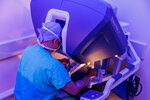

Those who suffer with head and neck cancers now have more treatment options thanks to Baptist Health’s new single-port robotic system, which helps surgeons remove tumors in hard-to-reach areas like the throat without the need for open surgery.
The robotic platform minimizes the impact on surrounding tissue, which can lead to improved outcomes and faster recovery times for patients.
Head and neck cancers most often appear in the nasal cavity, sinuses, lips, mouth, salivary glands, thyroid glands, throat and larynx and account for about 100,000 cancers diagnosed in the U.S. each year.
Targeted treatment
Using the single-port robotic system, surgeons can perform complex procedures through a natural opening (i.e. the mouth).
From a single port designed to navigate small, narrow openings, three tiny arms containing a flexible camera and surgical instruments act as an extension of the surgeon’s hand. The surgeon guides the robot’s movements via a console, enabling a precise, minimally invasive option to treat certain head and neck cancers and offering patients the opportunity to avoid or lessen additional cancer treatments, including reducing the need for radiation and chemotherapy.
Meeting a community health need
Consistent with national trends, Baptist MD Anderson Cancer Center has seen a rise in oropharyngeal cancers in this region, including cancers affecting the palate, throat, base of tongue and tonsils.
According to experts, the majority of newly diagnosed throat cancers are caused by human papillomavirus (HPV), a sexually transmitted infection that 80% of the population will be exposed to during their lifetime. Approximately 70% of oropharyngeal cancers in the U.S. are HPV-related, and more people are being diagnosed with the disease at a younger age.
“We’re seeing a lot more young people with throat cancer,” said Faisal Ahmad MD, section chief of head and neck surgical oncology at Baptist MD Anderson. “Being able to offer them a minimally invasive surgical alternative is important to avoid the long-term effects of radiation to the head and neck. Plus, time is a critical factor when it comes to oropharyngeal cancers because a 2 cm tumor can easily double in size in eight weeks. Having a robot specifically for these surgical procedures means we can act quickly and provide earlier interventions, which leads to better outcomes.”
In some cases, oropharyngeal cancers are preventable. In addition to avoiding or quitting smoking and heavy alcohol use, getting the HPV vaccine can prevent up to 90% of HPV-related cancers, including oropharyngeal cancers. The vaccine is most effective when administered during the pre-teen years (ages nine to 12) but can be given up to the age of 45.
“We want our patients to be active participants in their health, and take steps to reduce their risk of disease,” said Matthew A. Zuino, executive vice president and chief operating officer of Baptist Health. “And if they ever suspect that their symptoms could be cancer, we want to make sure we have the right treatment at the right time to ensure they have an excellent outcome and experience. That’s why we are constantly prioritizing investments in our people, facilities, equipment and technologies — to enhance access, create efficiencies and continuously improve our care.”